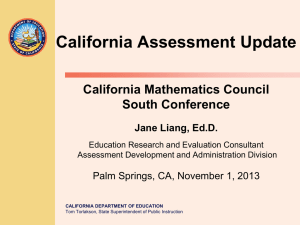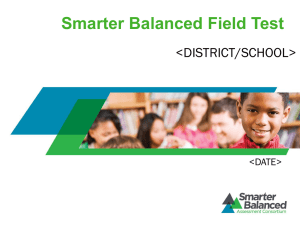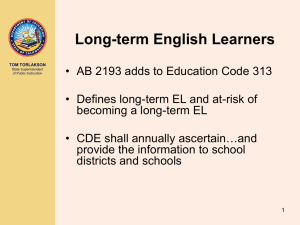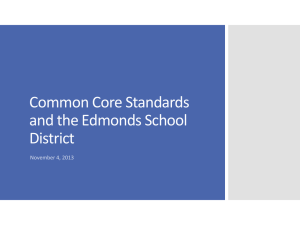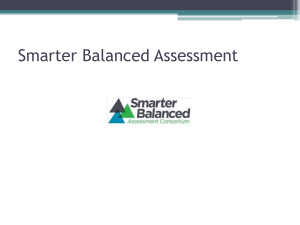Transitioning California to a Balanced Assessment System
advertisement
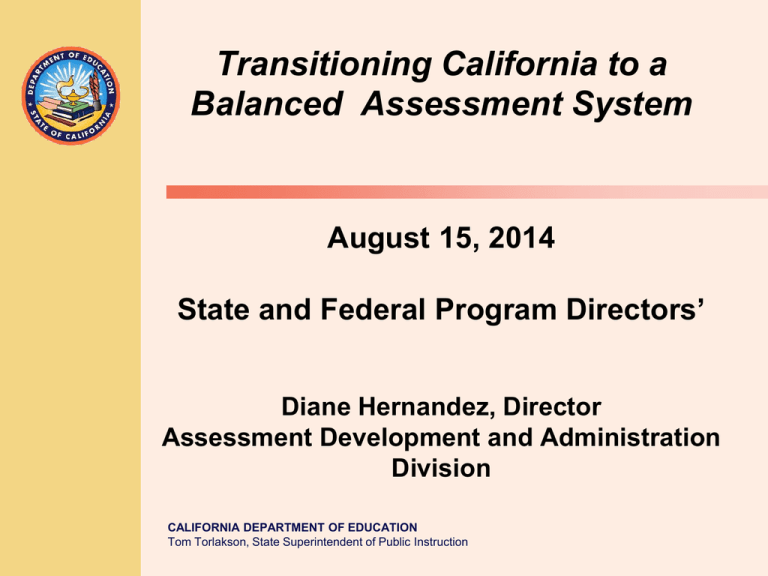
Transitioning California to a Balanced Assessment System TOM TORLAKSON State Superintendent of Public Instruction August 15, 2014 State and Federal Program Directors’ Diane Hernandez, Director Assessment Development and Administration Division CALIFORNIA DEPARTMENT OF EDUCATION Tom Torlakson, State Superintendent of Public Instruction Objectives TOM TORLAKSON State Superintendent of Public Instruction • Implementation of College and Career Readiness • Smarter Balanced Assessment System ‾ Summative assessment ‾ Formative tools ‾ Interim assessment • • • • • • Smarter Balanced Field Test Update 2014–15 Assessments Smarter Balanced Supports Computer-Adaptive Testing 2013–14 Reporting 2014–15 Reporting 2 Journey Towards the Implementation of College and Career- Readiness California adopts Common Core State Standards authorized through SB15X legislation CDE releases Common Core implementation plan Pilot test Smarter Balanced summative assessment California joins Smarter Balanced as a governing state CA develops rigorous content standards 2015 2012 2010 2014 STAR sunsets (July 2014) – AB 484 - STAR 2001 CA aligns assessments to standards Field test Smarter Balanced summative assessment Operational test Smarter Smarter Smarter Balanced Balanced Balanced summative interim formative assessment assessment tools 2013 2011 1997 Transitioning to a New Assessment System Report released by Supt. Torlakson Supt. Torlakson conducts outreach to develop recommendations for new assessment system (required by AB 250 March 2012) replaced by CAASPP TODAY: California prepares for a next generation, world-class system ▪ Developing new curriculum frameworks ▪ Building new professional development modules ▪ Adopting new instructional materials ▪ Conducted Smarter Balanced Field Test ▪ Developing formative tools and interim assessments Achievement levels established to signal college and career readiness 3 Smarter Balanced Assessment System Summative: College and career readiness assessments for accountability TOM TORLAKSON State Superintendent of Public Instruction Common Core State Standards specify K-12 expectations for college and career readiness Teachers and schools have information and tools they need to improve teaching and learning Formative tools: Supporting classroom-based assessments to improve instruction All students leave high school college and career ready Interim: Flexible and open assessments, used for actionable feedback 4 Smarter Balanced Field Test Update TOM TORLAKSON State Superintendent of Public Instruction • About 3.2 million California students were anticipated to participate in the Field Test • Approximately 3.19 million students completed testing • Accounts for more than 73% of all Smarter Balanced testing 5 Smarter Balanced Field Test Update (cont.) TOM TORLAKSON State Superintendent of Public Instruction • Concurrent users – California was prepared for 500,000 concurrent test takers – 184,000 users represented the peak on April 29th • Technical Assistance Center (CalTAC) – The average number of daily contacts: 549 – CalTAC contact requests: • Resetting passwords • General test administration questions 6 Smarter Balanced Field Test Feedback TOM TORLAKSON State Superintendent of Public Instruction • Mid-testing Surveys for LEA Coordinators – Testing Window One • 102 respondents – Testing Windows Two and Three • 344 respondents • Post-testing Survey – Released June 27, 2014 – Designed for LEA coordinators, technology coordinators, and teachers and administrators 7 Mid-Testing Survey Feedback TOM TORLAKSON State Superintendent of Public Instruction “We chunked each week by grade level districtwide, and it seems to be working well. It regulates the number of students online, and gives each school a manageable target per week.” “Overall 99% positive…students have been doing fine, teachers were a bit more stressed. Kids are engaged and excited about it…get antsy if they don’t get started on time and are sitting around waiting. Kids were using scratch paper. Having a tech person at site helped. Staggered start time and dates was very helpful.” 8 Mid-Testing Survey Feedback (cont.) TOM TORLAKSON State Superintendent of Public Instruction “...Our training sessions have paid off. Coordinators and TAs are able to start test sessions and students are logging in and using our ID cards we provided all sites. Students are terrific! We’ve had some access problems. By far, our biggest headache…has been password resets.” 9 Smarter Balanced Field Test Feedback TOM TORLAKSON State Superintendent of Public Instruction • Focus Groups designed to gather input from participants regarding their experience with the Field Test will held in July and August 2014. – LEA Coordinators and Test Administrators – Parents and students 10 TOM TORLAKSON State Superintendent of Public Instruction Smarter Balanced Summative Assessment 2014–15 • Grades 3–8 and 11 • Grade 11 used for Early Assessment Program (EAP) purposes • Test windows: – Grades 3–8; students will have received 66% of instructional days – Grade 11; students will have received 80% of instructional days 11 Example of Smarter Balanced Testing Window 2014–15 TOM TORLAKSON State Superintendent of Public Instruction • Middle School grades 7–8 • 180 Instructional Day School Year • First day of testing window is on the 121st instructional day (66%) • First day of school: August 25, 2014 • Holidays: 26 days (August – June) • First Day of Testing: March 9, 2015 • Last Day of Testing: June 5, 2015 12 Additional CAASPP Assessments Testing Window Information 2014–15 TOM TORLAKSON State Superintendent of Public Instruction Testing window: 25 days that includes 12 days before and after completion of 85 percent of instructional days • CST, CMA, & CAPA – Science* – Grades: 5, 8 &10 • Alternate Assessment to replace CAPA – ELA and mathematics – Grades: 3–8 & 11 – Testing window: TBD • STS – Reading Language Arts* – Grades 2–11 * Paper-pencil only 13 Achievement Level Setting Panels for Smarter Balanced Assessments TOM TORLAKSON State Superintendent of Public Instruction • This fall, educators, parents, and business/community members will participate in online and in-person panels to provide recommendations for setting achievement levels for the Smarter Balanced summative and interim assessments. – In-person panel; October 13–19 – Online panel; registration deadline- September 19 http://smarterbalanced.measinc.com/EventCode/100614 – Comments taken October 5–17 14 Smarter Balanced Practice Tests and Training Tests TOM TORLAKSON State Superintendent of Public Instruction • Practice Tests – Provide students with grade-specific testing experience similar in format and structure to the Field Test, including available supports. • Training Tests – Allow teachers and students to experience the features, functionality, and item types in computerbased testing. – A training test is available for each of three grade bands (3–5, 6–8, and high school) and contains approximately 6–9 items per band, per content area. • Practice tests and training tests are available at http://sbac.portal.airast.org/practice-test/. 15 Comparison of Training Tests and Practice Tests Purpose Grade Levels Number and Types of Items Universal Tools, Designated Supports, and Accommodations Scoring Training Tests Practice Tests Provide students with an opportunity to quickly become familiar with the software and interface features Provide students with a grade specific testing experience that is similar in structure and format to the Field Test 3 grade bands •3–5 •6–8 •High school Each grade •3–8, 11 Approximately 15 items per grade band (6 in ELA and 8–9 in math) Approximately 30 items in ELA and 30 items in math per grade level No performance task Includes 1 ELA performance task and 1 math performance task per grade level All that are included on the Field Test are included on the Training Test Most included Refresh scheduled later in the year Items are not scored Items are not scored; however, answer keys and scoring rubrics are available Smarter Balanced Formative Assessment ToolsDigital Library TOM TORLAKSON State Superintendent of Public Instruction • This is an optional component that the State is making available to LEAs. • The library is comprised of exemplar resources for instructional practices and professional learning. • Resources can assist teachers in using the formative assessment process. 17 Smarter Balanced Digital Library (cont.) TOM TORLAKSON State Superintendent of Public Instruction • Formative assessment is a deliberate process used by teachers during instruction that provides actionable feedback that is used to adjust teaching and learning strategies to improve students’ attainment of learning targets/goals. • Includes four attributes: 1. clarify intended learning 2. elicit evidence 3. interpret evidence, and 4. act on evidence 18 Smarter Balanced Digital Library (cont.) TOM TORLAKSON State Superintendent of Public Instruction • Digital Library Preview – June 3 through September 30, 2014 – Test the initial software application – Provide users access to an initial set of resources that will grow – LEAs register users for access during the preview period – Link to Digital Library: https://www.smarterbalancedlibrary.org (This link is for registered users) 19 Interim Assessments TOM TORLAKSON State Superintendent of Public Instruction • Will consist of comprehensive assessments and item assessment blocks. • Will launch in Fall 2014/Winter 2015 • Will be created from test items deemed valid, reliable, and fair from the Smarter Balanced field test. • Will build out over time. 20 Interim Assessments (cont.) TOM TORLAKSON State Superintendent of Public Instruction • Two types of interim assessments will be available: – Interim comprehensive assessment (ICA), similar to the Smarter Balanced Summative Assessment – Interim assessment blocks (IAB), groups of test items that will assess certain aspects of a topic or standard(s) • Both will begin as fixed-form tests, and computer adaptive tests (CAT) will be added. 21 Computer Adaptive Technology for Summative and Interim Assessments Faster results • Turnaround in weeks compared to months today Shorter test length • Fewer questions compared to fixed form tests Increased precision • Provides accurate measurements of student growth over time Tailored to student ability • Item difficulty based on student responses Greater security Mature technology • Larger item banks mean that not all students receive the same questions • GMAT, GRE, COMPASS (ACT), Measures of Academic Progress (MAP) Reporting Results 2013–14 TOM TORLAKSON State Superintendent of Public Instruction • CST, CMA, & CAPA – Science – Grades: 5, 8 &10 • CAPA – ELA and mathematics – Grades: 2–11 • STS – Reading Language Arts – Grades 2–11 23 CAASPP Reporting Results 2014–15 TOM TORLAKSON State Superintendent of Public Instruction • Reported at the state, county, LEA, site and grade levels • Paper reports at the aggregate and student level will be provided • Score reports will be redesigned to include Smarter Balanced ELA and mathematics • Redesigning Web reporting site 24 CAASPP Reporting Results 2014–15 TOM TORLAKSON State Superintendent of Public Instruction • Smarter Balanced – ELA and mathematics – Grades 3–8 & 11 • CST, CMA, & CAPA – Science* – Grades: 5, 8 &10 • STS – Reading Language Arts* – Grades 2–11 *Paper-pencil only 25 Smarter Balanced Reporting Results 2014–15 TOM TORLAKSON State Superintendent of Public Instruction • Smarter Balanced Reports – Interactive online for Interim Assessments – Aggregate score data: TBD at the local level – Custom subset filters by gender and demographic data – Downloadable as PDF files 26 For Further Information TOM TORLAKSON State Superintendent of Public Instruction CDE CAASPP Office http://www.cde.ca.gov/ta/tg/ca/ caaspp@cde.ca.gov 916-445-8765 CDE Smarter Balanced Web Page http://www.cde.ca.gov/smarter/ CDE Testing and Accountability Web Page http://www.cde.ca.gov/ta/ 27
